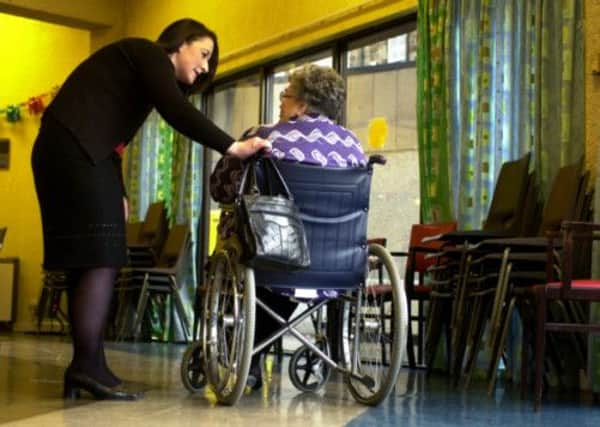Jayne Dowle: Time for a grown-up conversation on realities of caring for elderly parents


It’s a heartening idea, but it’s never going to happen. Care services are already pushed to breaking point. Something’s got to give. And like it or not, the giving is going to have to come from those of us fit enough to look after those who are not.
A new report for the Leonard Cheshire Disability charity finds that growing numbers of elderly and disabled people are looked after in flying visits of no more than 15 minutes. This means stark and distressing choices: a hot bath or a warm drink, a microwaved meal or a clean lavatory. No time for chat. Certainly no time for carers to do the job they are supposedly paid to do, to actually care.
Advertisement
Hide AdAdvertisement
Hide AdCan you imagine how confusing these visits are for those already muddled by dementia? How dangerous are they, especially for those who require complicated combinations of medication? How many mistakes are made on a daily basis? It doesn’t bear thinking about.
It is easy to blame local councils. They have to save money. There is simply not enough in budgets to meet all needs. Cutbacks must be made. That’s the big reason why calls are becoming so short.
In their defence, social care leaders argue that these 15-minute visits can be “fully justified”. Some tasks don’t need much longer to be carried out, they say. Tasks. That’s the key word, isn’t it? In today’s parlance, “tasks” equate to care. Yet we all know that being looked after properly is far more complex than providing a meal on a tray and switching on the gas fire.
That’s why we have to start talking about this now. We have to engage with the issue, not just in the House of Lords where the Care Bill is being debated, but within our own families. It’s not something we want to face; our mother becoming incapable of dressing herself, our father crying at the kitchen table because his own frailty means he can’t help her. We have to though. If we are lucky enough to still have our elderly relatives with us, we have to take some responsibility.
Advertisement
Hide AdAdvertisement
Hide AdGiven the failings in the system, we can’t just contract out all the caring and rely on someone else to do it on our behalf.
I understand that busy modern lives, complex family arrangements and geographical distances present problems. I know also, from personal experience, that providing constant support for vulnerable people can be utterly exhausting. Elderly people can be demanding and heart-breaking. Some of us are not natural carers.
However, I also know that too many selfish individuals turn their backs on their parents and absolve themselves of any direct involvement. They move to the other end of the country and assume that somehow mother will soldier on as she always has. And then they get the most tremendous shock when they come home for the annual visit and realise she can’t even walk across the bedroom without clinging onto the furniture. I’ve heard far too many people then moaning that “something must be done about mother” without it even entering their heads that they might have to move closer to her, or have her come to live with them.
The default options? Get carers in? Or sell the inheritance to cover care home fees? There is a frightening lack of imagination about how we look after our elderly people in this country. And it is becoming increasingly clear to me that we have to find new ways of working it out. Or looking to the past, weighing up how our own parents and grandparents did it. Or to other countries where multi-generational living is common and it is considered shameful to neglect your elders.
Advertisement
Hide AdAdvertisement
Hide AdEvery family is different. It is not my place to speak for you all, or to tell you what to do.
However, I do think it’s time we adjusted our collective attitude towards care for the elderly and vulnerable.
We can’t start talking about it early enough; before the dementia kicks in, before mother ends up lying on the bedroom floor alone all night with a broken hip. It’s got to stop being a secret, and start being a plan. If options have been discussed and put on stand-by, even the biggest shock can be dealt with. We’ve simply got to be grown-up about this.
Yet the unedifying spectacle of adult offspring falling out amongst themselves around a hospital bed and behaving like spoilt teenagers is all too common.
Advertisement
Hide AdAdvertisement
Hide AdEven if charities and campaigners succeed in their aim to get care visits last longer, this won’t tackle the underlying issue.
Our mothers and fathers are not products on a conveyor belt. They are human beings. Our own flesh and blood. We can’t let them down.
Whatever it takes, we must do better than relying on carers to provide all the care they need.